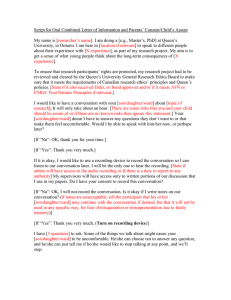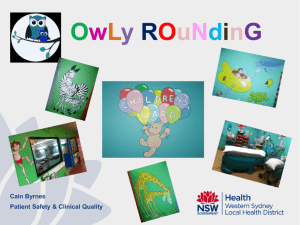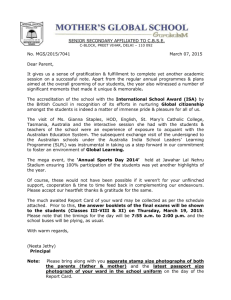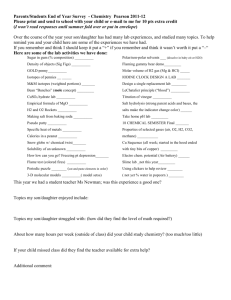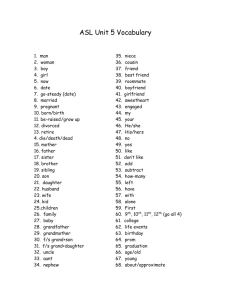Oral LOI/CF/Assent for Minors/Parents
advertisement
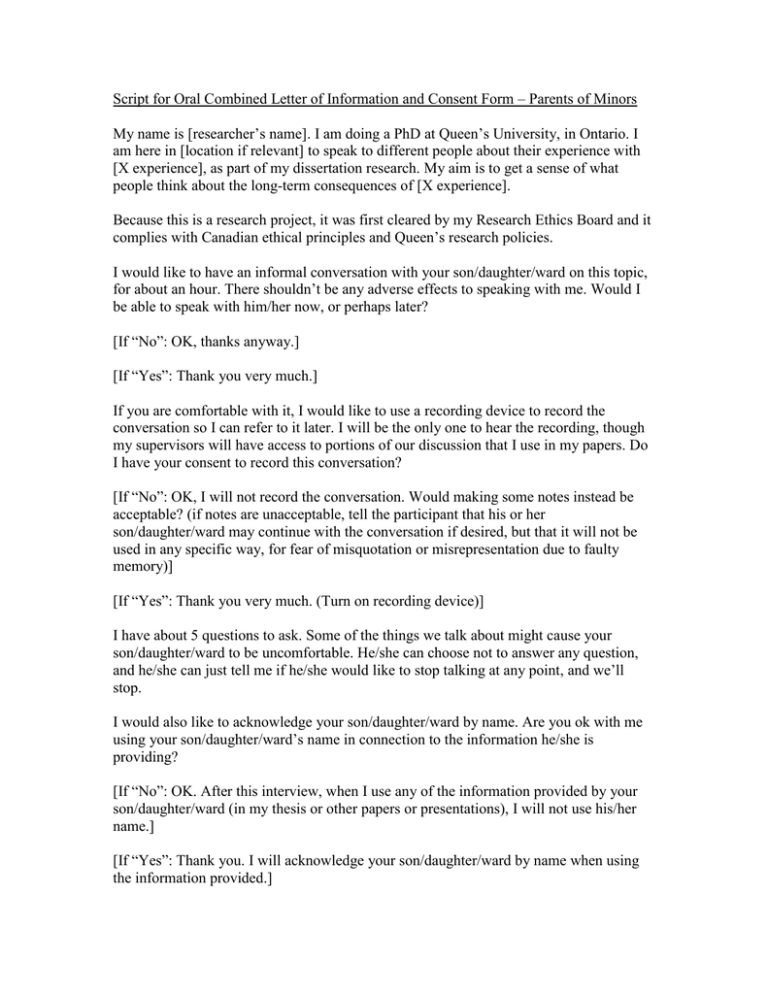
Script for Oral Combined Letter of Information and Consent Form – Parents of Minors My name is [researcher’s name]. I am doing a PhD at Queen’s University, in Ontario. I am here in [location if relevant] to speak to different people about their experience with [X experience], as part of my dissertation research. My aim is to get a sense of what people think about the long-term consequences of [X experience]. Because this is a research project, it was first cleared by my Research Ethics Board and it complies with Canadian ethical principles and Queen’s research policies. I would like to have an informal conversation with your son/daughter/ward on this topic, for about an hour. There shouldn’t be any adverse effects to speaking with me. Would I be able to speak with him/her now, or perhaps later? [If “No”: OK, thanks anyway.] [If “Yes”: Thank you very much.] If you are comfortable with it, I would like to use a recording device to record the conversation so I can refer to it later. I will be the only one to hear the recording, though my supervisors will have access to portions of our discussion that I use in my papers. Do I have your consent to record this conversation? [If “No”: OK, I will not record the conversation. Would making some notes instead be acceptable? (if notes are unacceptable, tell the participant that his or her son/daughter/ward may continue with the conversation if desired, but that it will not be used in any specific way, for fear of misquotation or misrepresentation due to faulty memory)] [If “Yes”: Thank you very much. (Turn on recording device)] I have about 5 questions to ask. Some of the things we talk about might cause your son/daughter/ward to be uncomfortable. He/she can choose not to answer any question, and he/she can just tell me if he/she would like to stop talking at any point, and we’ll stop. I would also like to acknowledge your son/daughter/ward by name. Are you ok with me using your son/daughter/ward’s name in connection to the information he/she is providing? [If “No”: OK. After this interview, when I use any of the information provided by your son/daughter/ward (in my thesis or other papers or presentations), I will not use his/her name.] [If “Yes”: Thank you. I will acknowledge your son/daughter/ward by name when using the information provided.] If at any point you or your son/daughter/ward decide that you don’t want a name attached to the information provided, you can let me know, even after I leave. I am giving you both my card so you can contact me at any point with questions or concerns about your participation in the project. The Band Council also has my contact information on file, and you can find it there if you lose my card. This card also includes the contact information of the General Research Ethics Board at Queen’s University, which granted clearance of this project according to the recommended principles of Canadian ethics guidelines, and Queen's policies. They can be contacted regarding any ethical concerns you may have about your son/daughter/ward’s participation in this study. Do you understand? Do you have any questions for me? [If “No”: Explain further] [If “Yes”: Okay, great. Do I have your consent to continue? [begin speaking with minor] Do you understand what I would like you to do? Do you have any questions for me about this project or about your participation in this project? Do you understand that you don’t have to answer any questions that make you feel uncomfortable? If you want me to stop asking you questions all you have to do is tell me and I will stop the interview. I won’t keep any information that you don’t want me to have. Do you want to be interviewed? Do you want me to use your name when I tell my story or do you want me to keep your name secret? Okay, we are going to begin the interview. I am turning on the microphone. [After interview:] Thank you for your time and for speaking with me. [To the parent(s)] Thank you for allowing me to speak to your son/daughter/ward.

